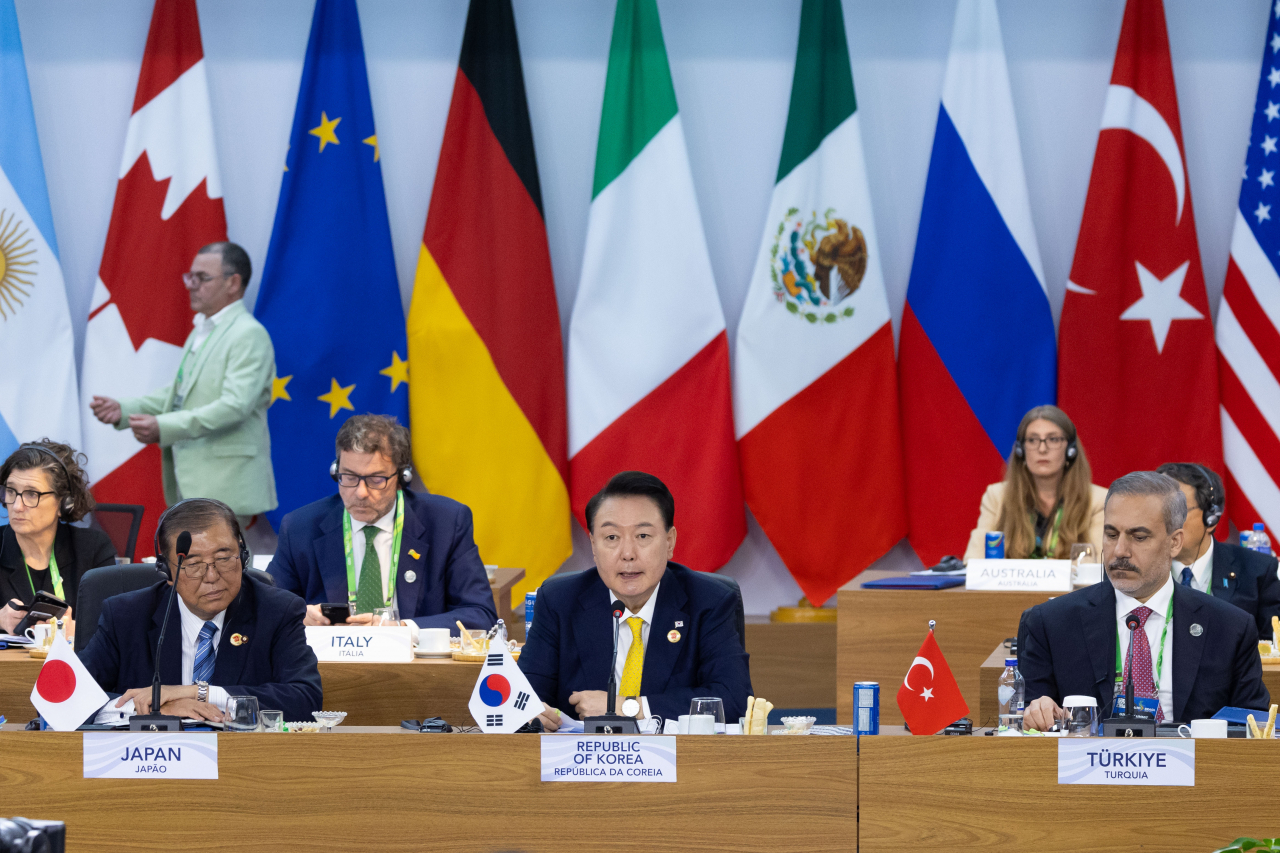
 |
| President Yoon Suk Yeol (center) attends the launch ceremony of the Global Alliance Against Hunger and Poverty at the Museum of Modern Art of Rio de Janeiro, a venue for the Group of 20 summit in Brazil, on Nov. 18, Monday. (Yonhap) |
President Yoon Suk Yeol wrapped up visits to Peru and Brazil on Tuesday, where he focused on expanding international solidarity against the deepening military cooperation between North Korea and Russia.
Yoon met with leaders of the Asia-Pacific Economic Cooperation gathering in Lima and joined the Group of 20 (G20) summit in Rio de Janeiro during the six-day trip, his first visit to South America since taking office in May 2022.
He used the diplomatic stages to issue a stern warning against North Korea's troop deployment to Russia in support of its war in Ukraine, considered a critical escalation in the grinding conflict that has now lasted almost three years.
The trip followed Yoon's warning that Seoul could reconsider its policy of not providing lethal weapons to Ukraine, depending on the level of military activities by Pyongyang and Moscow.
At the G20 sessions on Monday, Yoon decried the closer military alignment between Moscow and Pyongyang. He was joined by leaders from the United States, Japan, Australia and the European Union in condemning the latest developments.
In Lima, Yoon held a series of bilateral and multilateral meetings with leaders from the US and other partner nations to draw their support and bolster security against threats posed by North Korea's evolving nuclear and missile programs.
On Friday, Yoon met with US President Joe Biden and Japanese Prime Minister Shigeru Ishiba to reaffirm the importance of their trilateral partnership for regional security and announced the launch of a joint secretariat tasked with overseeing the countries' collaboration.
The move came as Washington's major Asian allies prepare for looming uncertainties surrounding former US Donald Trump's return to the White House in January, with his "America First" policy based on a transactional approach to security and trade.
Yoon also held a farewell summit with Biden to look back on their partnership over the past 2 1/2 years, and sat down with Ishiba for a discussion on ways to further upgrade bilateral ties, in which they agreed to continue "shuttle diplomacy."
Another notable diplomatic engagement was Yoon's summit with Chinese President Xi Jinping, who has shown signs of uneasiness over the closer alignment between Moscow and Pyongyang, Beijing's two allies.
During their first in-person meeting in two years, Yoon asked Xi to play a "constructive" role in reining in North Korea's provocations and its deepening military ties with Russia.
Xi, for his part, emphasized China does not want escalating tensions on the Korean Peninsula and expressed hope to improve ties between the two neighboring nations.
On the margins of the APEC summit, Yoon also held a series of bilateral talks with the leaders of Canada, Vietnam, Brunei and Peru to explore ways to forge deeper economic and security ties in the Indo-Pacific region.
On Sunday, Yoon traveled to Rio de Janeiro for the G20 summit, marking his third consecutive participation in the gathering of the world's major economies.
At the G20, South Korea joined the establishment of the Global Alliance Against Hunger and Poverty and pledged $10 million in humanitarian aid to alleviate the food crisis in Africa.
In line with South Korea's vision to play a greater role on the global stage, Yoon also reaffirmed Seoul's commitment to carbon-free energy initiatives and financial support for countries vulnerable to climate change.
During this year's summits held after Trump's election win, Yoon engaged in a careful balancing act between the US, South Korea's traditional ally, and China, its largest trading partner.
In an interview with the Brazilian newspaper Folha de S.Paulo, Yoon expressed hope for working closely with both the US and China, saying South Korea's approach to relations with the greater powers is not about "choosing one country or the other."
The notable shift in his tone raised questions over whether Yoon is recalibrating his US-focused diplomatic strategy to a more balanced approach under the incoming Trump administration, which is expected to take a more hawkish stance on Beijing and pressure its allies to pay more on their defense.
Yoon's office explained that Seoul has consistently focused on pursuing national interests in both security and economy, stressing the importance of continuing high-level communication to further improve ties with Beijing.
During their summit, Yoon and Xi exchanged invitations to visit each other's countries to continue their discussions. (Yonhap)









